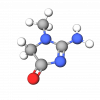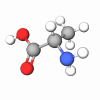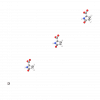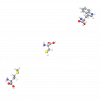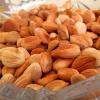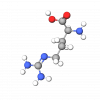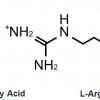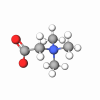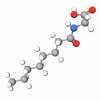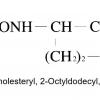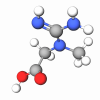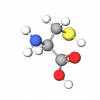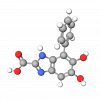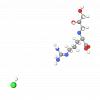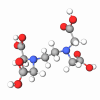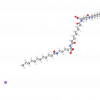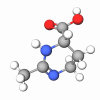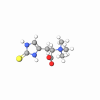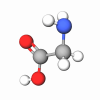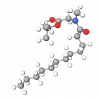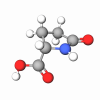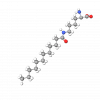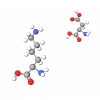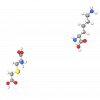1-Methylhydantoin-2-Imide, also called Creatinine (former designation: 2-imino-N-methylhydantoine), is a byproduct of muscle metabolism that occurs in the human body. It is a natural amino acid derivative and performs important biological functions.
Amino acids
Amino acids are organic compounds produced from the amine and carboxylic acid functional group. The key elements of amino acids are carbon, oxygen, nitrogen, and hydrogen. About 500 amino acids can be classified in six main ways: aliphatic, hydroxic, aromatic, basic, and acidic, plus their amide. Further, other non-protein amino acids act as metabolic intermediates.
Amino acids are useful not only in human nutrition but also in the cosmetic industry. In human nutrition, amino acids are used to synthesize proteins and additional biomolecules; thus, they are found in the human body. These compounds are the building blocks our organism uses to build its proteins, enzymes, and peptides.
Famous skin proteins collagen, elastin, and keratin are also made of amino acids. In addition, they are oxidized to urea and carbon dioxide to generate energy.
However, amino acids' function is not limited to building dermal proteins. They are also involved in regulating a large number of processes associated with skin healing, moisture retention (NMFs), and protection from UV irradiation. Due to their comprehensive beneficial features, safety, and insensibility, amino acids are common ingredients in many beauty concoctions.Moreover, many amino acid derivatives are used as gentle detergents in cleansing applications or serve as emollients, antioxidants, chelating agents, etc.
Aluminum salts owe their antiperspirant efficacy to their astringent, antiseptic, and antiperspirant powers but can be irritants.
Aminodermin CLR is a sulfurous amino acid concentrate, a water-soluble sebaceous modulator for skin and hair care applications. It improves the structural properties of greasy skin and damaged and greasy hair.
Apricot Kernel Amino Acids is an active fruit amino acid complex derived from the complete hydrolization of the protein found in the apricot (Prunus Armeniaca) kernel. It is an all-natural moisturizer with an exotic appeal. It is known under the trade name Hydroapricot AA.
Arginine Cocoate is an all-natural and botanical amino acid detergent created from L-arginine and coconut fatty acid. L-arginine is derived from glucose through a fermentation process.
Carnitine Isomerized Linoleate is a conjugate of L-Carnitine with linoleic acid, a lipolytic, energizing, and anti-cellulite ingredient. This slimming agent delivers a notable reduction of body fat and the development of thin mass.
Cholesteryl/Behenyl/Octyldodecyl Lauroyl Glutamate is an emollient derived from L-glutamic acid, lauric acid, and three alcohols (cholesterol, 2-octyldodecanol, and behenol).
Amino acids have been widely used in cosmetics, primarily in hair care preparations, where they have been touted for their ability to restore “life” to thinning hair, helping to increase volume and fullness.
Cysteine is a sulfur-containing, proteinogenic, semi-essential amino acid. It is widely used for a wide range of applications, including in the food sector as a dough conditioner and a flavoring agent.
Dihydroxyphenyl Benzimidazole Carboxylic Acid is a functional ingredient with anti-pollution, anti-oxidant, anti-aging, and sun filter booster activity. It can compensate for damaging factors involved in environmental pollution.
Dihydroxypropyl Arginine HCL is a conjugate of Glycerin and Arginine that combines both ancestors' moisturizing (NMF) and high adsorption power.
Disodium Sebacoyl Bis-Lauramidolysine is a sodium salt of a diester of Sebacic acid with Lauroyl Lysine. It is an amino acid-based multifunctional surfactant and emollient with unique properties for skin and hair care applications. It is a white powder barely soluble in water and oils.
HMA has been developed as a delivery system for hair with excellent substantivity and coacervation techniques.
Isopropyl Lauroyl Sarcosinate is a derivative of plant-derived palm fatty acids and sarcosine with isopropyl alcohol. In personal care applications it serves as a potent solubilizer, polar emollient, viscosity modifier, and sensory enhancer.
Keratin Amino Acids are made by carefully hydrolyzing sheep's wool or deer hair down to a low molecular weight and consist of a mixture of free amino acids, dipeptides, tripeptides, and tetrapeptides.
Lauroyl Lysine is a fine white powder, a perfect organic powder for makeup, hair, and skincare products. Its hydrophobic characteristic improves makeup water resistance and improves the flow and spread of the oil/powder mixture.
Lysine Aspartate is an amino acid complex, a product of condensation of natural L-lysine and L-aspartic acid, without preservative.
Lysine Carboxymethyl Cysteinate is a synthetic amino acid derivative obtained through the reaction of cystine with monochloroacetic acid, followed by salification with lysine.
